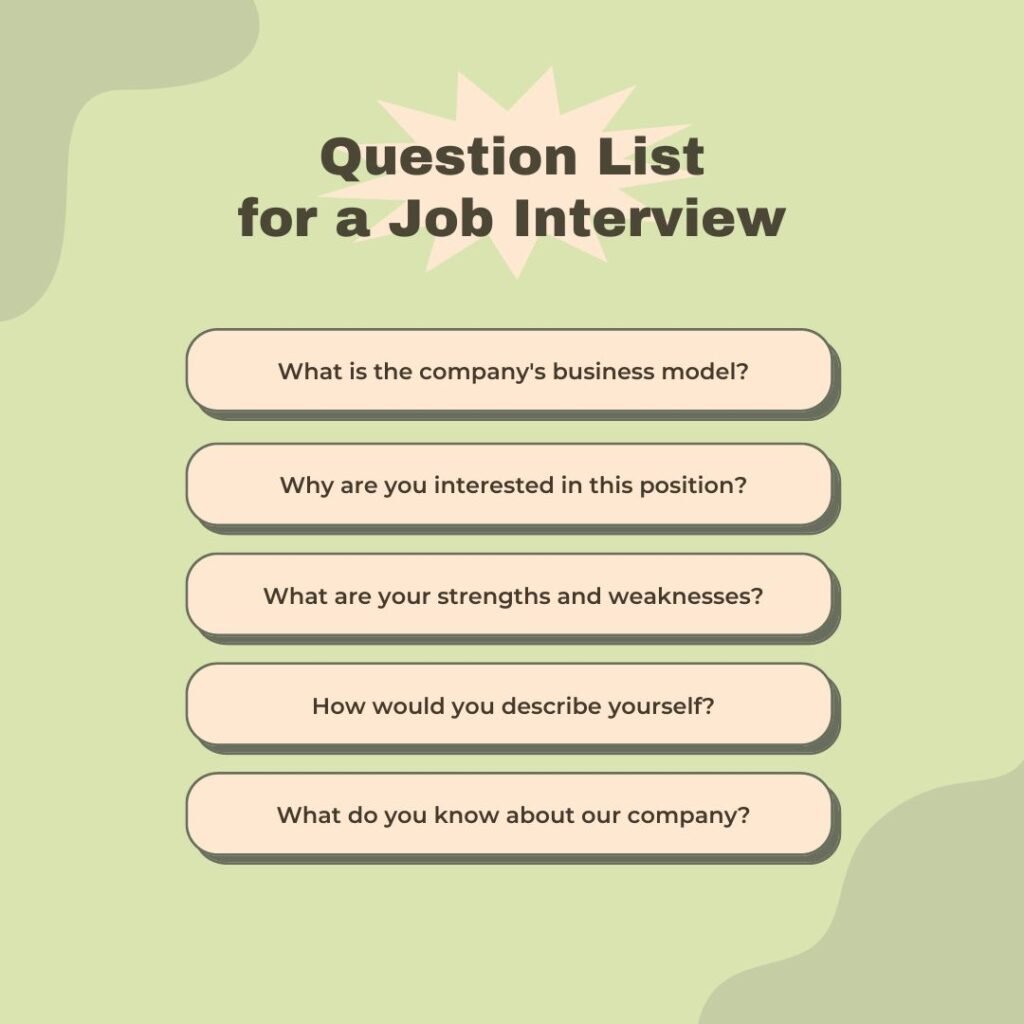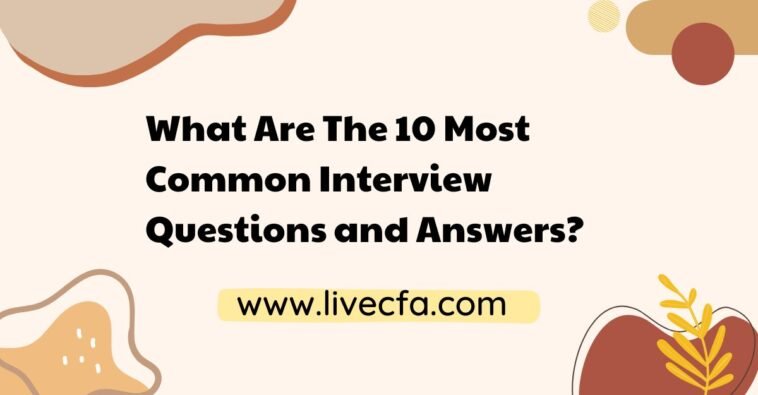Are you preparing for a job interview and want to master it? But what and how? Look no further. In this article, we will guide you through the 10 most common interview questions and provide expert answers to help you master your next interview.
Navigating an interview can be a menace, however, with the right preparation and knowledge, you can confidently tackle any question that comes your way.
From “Tell me about yourself” to “What are your strengths and weaknesses?” we have got you covered.
Our comprehensive guide will not only equip you with the best answers but also provide valuable insights and tips on how to structure your responses effectively.
We understand the significance of showcasing your skills and experience in a way that impresses the interviewer.
Whether you are a recent graduate or a seasoned professional, this article will help you stand out from the competition and increase your chances of landing your dream job.
Don’t miss this opportunity to gain an edge in your next interview. Let’s get started on your path to interview success.
Understanding The Most Common Interview Questions
Interviews often follow a similar structure, with certain questions being asked more frequently than others.

Understanding these common questions is the first step toward interview success. By familiarizing yourself with these questions, you can prepare thoughtful and concise answers that highlight your qualifications.
Tell Me About Yourself
One of the most common questions you will be asked unexpectedly is “Tell me about yourself.” This open-ended question allows you to provide a brief overview of your background, education, and relevant experience.
Keep your response focused on your professional achievements and skills that directly relate to the position you are interviewing for.
You May Also Read This:
How To Answer the Tell Me About Yourself Interview Question?
What Are Your Strengths and Weaknesses?
Another frequently asked question is “What are your strengths and weaknesses?” When discussing your strengths, highlight skills that are relevant to the job and provide examples of how you have demonstrated these strengths in previous roles.
For weaknesses, choose an area where you have shown improvement or are actively working on, and explain the steps you have taken to overcome it.
Remember, it is important to tailor your answers to the specific job requirements and company culture.
Researching the organization beforehand will give you valuable insights into its values and priorities, allowing you to align your responses accordingly.
Preparing For The Interview: Research and Self-Reflection
What are the 10 most common interview questions and answers, so that proper preparation is important to performing well in an interview? Start by thoroughly researching the company and the role you are applying for.
Understand their mission, values, and recent achievements. This knowledge will not only help you answer questions more effectively but also demonstrate your genuine interest in the company.
In addition to researching the company, take some time for self-reflection. Identify your key accomplishments, skills, and experiences that are relevant to the job.
Think about how you can articulate these in a way that showcases your value to the employer.
Also, it is critical to anticipate potential questions that may arise during the interview. Practice answering them out loud, either by yourself or with a trusted friend or family member. Pay attention to your tone, body language, and delivery.
Remember, practice makes perfect, so the more you practice, the more confident you will become.
Crafting Impactful Answers: The STAR Method
Crafting impactful answers requires a structured approach. One effective method is using the STAR method, which stands for:
Situation
- Task
- Action
- Result
This framework allows you to provide a clear and concise answer that shows your problem-solving skills and showcases your accomplishments.
When using the STAR method, start by describing the Situation or context in which the problem or task occurred. Next, explain the Task or challenge you faced.
Then, outline the specific Actions you took to address the situation. Finally, share the Result or outcome of your actions, emphasizing the positive impact you made.
Using the STAR method not only helps you provide a well-organized response but also allows you to provide concrete examples that validate your skills and experience.
Practice using this method in different scenarios to ensure you can adapt it to various questions.
You May Also Read This:
What Are The 5 Tough Interview Questions and Answers?
Mastering Behavioral Questions
Behavioral questions are designed to assess how you have handled specific situations in the past, as they believe past behavior is a good indicator of future performance.
- These questions often start with phrases like “Tell me about a time when” or “Give me an example of.
- It is important to prepare for these questions, as they require you to provide specific examples from your previous experiences.
- When answering behavioral questions, remember to use the STAR method to structure your response. Choose examples that illustrate your skills, problem-solving abilities, and how you have positively contributed to previous teams or projects.
- Be sure to highlight your role in the situation and the outcomes achieved.
- By preparing for behavioral questions and having specific examples ready, you will be able to provide compelling and relevant answers that demonstrate your capabilities and suitability for the job.
Handling Situational and Hypothetical Questions
In addition to behavioral questions, during an interview, you may also run into:
- Situational Questions
- Hypothetical Questions
These questions assess your ability to think on your feet and judge your problem-solving skills in real time.
Situational Questions
Situational questions Present hypothetical scenarios and ask how you would handle them. It is important to approach these questions methodically by breaking down the situation, considering different perspectives, and proposing a logical course of action.
Remember to explain your reasoning behind your choices and demonstrate your ability to think critically.
Hypothetical Questions
Hypothetical questions, on the other hand, may ask you to solve a problem or provide an innovative solution.
These questions assess your creativity, analytical thinking, and ability to adapt to new situations. Take your time to analyze the question, ask clarifying questions if needed, and provide a well-thought-out response that showcases your problem-solving abilities.
Addressing Strengths and Weaknesses
One of the trickier interview questions is addressing strengths and weaknesses. It is important to strike a balance between showcasing your skills and acknowledging areas for improvement.
1-Interview Strengths
When discussing your strengths, focus on those that directly align with the job requirements. Provide examples of how you have utilized these strengths to achieve success in previous roles. Be confident but avoid sounding arrogant. Remember, it’s not just about listing your strengths but also demonstrating how you have applied them to make a positive impact.
2-Interview Weaknesses
When addressing weaknesses, be honest but also highlight the steps you have taken to overcome them. Choose a weakness that is not directly related to the core requirements of the job and explain how you have actively worked on improving in that area.
Emphasize your willingness to learn and grow, and discuss any training or development opportunities you have pursued.
Explaining Employment Gaps Or Career Changes
Employment gaps or career changes can be viewed as red flags by potential employers. It is important to address these situations honestly and provide a clear explanation that highlights your adaptability, resilience, and commitment to personal and professional growth.
- When explaining employment gaps, focus on any relevant activities or experiences you pursued during that time.
- Highlight any freelance work, volunteering, or additional training you undertook. This shows that you were proactive and continued to develop your skills and knowledge during your time away from traditional employment.
- Similarly, when discussing career changes, explain the reasons behind your decision and how it has contributed to your personal and professional growth.
- Emphasize your transferable skills and how they align with the requirements of the new role.
- Highlight any relevant experiences or training that bridge the gap between your previous career and the one you are pursuing.
Nailing The Interview Question “Tell Me About Yourself”
The “Tell me about yourself” question is often asked at the beginning of an interview and sets the tone for the rest of the conversation.
So, crucial to provide a concise and compelling response that captures the interviewer’s attention and highlights your relevant qualifications.
When answering this question, focus on your professional background, experiences, and achievements that directly relate to the job you are interviewing for.
Also, avoid sharing personal information or unrelated details. Instead, provide a brief overview of your career trajectory, highlighting key accomplishments and skills that make you an ideal candidate for the position.
Remember what the 10 most common interview questions and answers are to practice your response to this question, and refine it based on the specific job requirements and company culture.
Tailor your answer to align with the organization’s values and priorities, emphasizing how your skills and experience can contribute to their success.
Conclusion: Confidence and Practice Make Perfect
What are the 10 most common interview questions and answers? So, in conclusion, mastering the 10 most common interview questions requires preparation, self-reflection, and practice.
By understanding the questions, researching the company, and crafting impactful answers using the STAR method, you can confidently navigate any interview situation.
Remember to also prepare for behavioral, situational, and hypothetical questions, showcasing your problem-solving abilities and adaptability.
Addressing strengths and weaknesses and explaining employment gaps or career changes requires honesty and a focus on personal and professional growth.
Finally, nailing the “Tell me about yourself” question sets a positive tone for the interview. Tailor your response to align with the job requirements and company culture, emphasizing your relevant qualifications and achievements. With confidence and practice, you can ace your next interview and increase your chances of landing your dream job. So, start preparing today and set yourself up for interview success.


